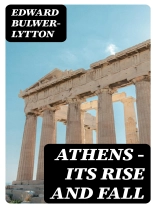In ‘Athens – Its Rise and Fall, ‘ Edward Bulwer-Lytton meticulously chronicles the socio-political landscape of ancient Athens, exploring its transition from a nascent city-state to a dominant cultural beacon of the classical world. The book employs a narrative style that intertwines historical analysis with vivid storytelling, marking a blend of Romantic literary sensibility and Enlightenment rationality. Bulwer-Lytton’s work stands as a significant contribution to 19th-century historical literature, reflecting his engagement with contemporary debates on governance, democracy, and the consequences of power as echoed in the trials of Athenian democracy. Bulwer-Lytton, a known figure in both literary and political circles, was deeply influenced by his fascination with classical antiquity and a belief in its lessons for modern society. His experiences as a politician and novelist informed his understanding of historical themes, and his intention to inspire moral and political reflection resonates throughout the text. In this work, he seeks to draw parallels between the aspirations of Athenian society and those of his contemporaries, commenting on the cyclical nature of history. This book is highly recommended for readers interested in the interplay between history and literature, as it masterfully captures the spirit of a civilization that shaped the very foundations of Western thought. Whether you are a scholar of ancient history or a casual reader drawn to classical literature, ‘Athens – Its Rise and Fall’ promises to offer valuable insights and compelling narratives that remain relevant today.
Sobre o autor
Edward Bulwer-Lytton (1803–1873) was a prolific English writer, who earned a permanent niche in the literary world with his penchant for ornate prose and supernatural themes. His literary career spanned a variety of genres, encompassing poetry, plays, and novels that were immensely popular during the Victorian era. Educated at Cambridge University, Bulwer-Lytton displayed a precocious talent for writing, which later flourished into a successful professional pursuit. Notably, his historical work ‘Athens – Its Rise and Fall’ reflects his deep engagement with classical history and his narrative skill in elucidating the complex tapestry of political, cultural, and philosophical developments of ancient Greece. As an author, he was known for his ability to blend romantic idealism with a certain gothic sensibility, as seen in his acclaimed novels such as ‘The Last Days of Pompeii’ and ‘The Coming Race’. His writing style, characterized by elaborate and sometimes florid language, has been both admired and parodied, particularly the famous opening line from his novel ‘Paul Clifford’, ‘It was a dark and stormy night…’. Despite this, his influence on the literary and political world of his time was indisputable, and his works continue to be of academic interest for those studying the literature and culture of the 19th century.












